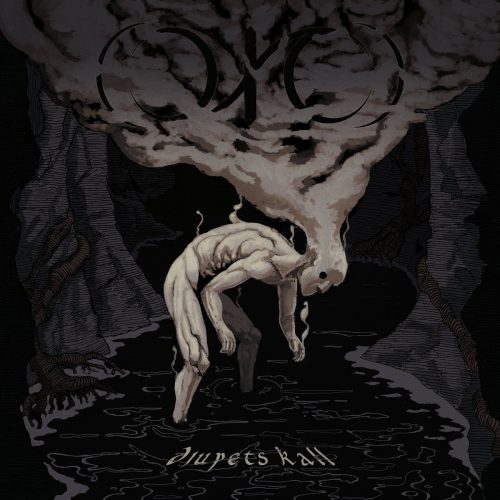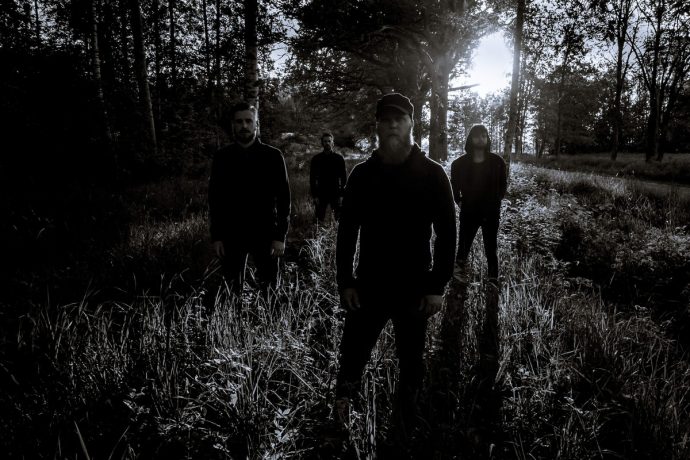(Andy Synn discusses the new album by the Swedish band Oro, which was released on March 1 of this year. And you’ll notice that we dispensed with a genre reference in this introduction, for reasons that will become apparent.)
The term “Post Metal” often inspires a surprisingly strong, and strongly negative, reaction from certain members of the Metal community.
Some people feel that, as a genre-tag, it’s too nebulous and ill-defined (an opinion which, as you’ll soon see, I have some sympathy with), while others feel that the entire claim of being “Post-“ Metal reeks of an unearned sense of arrogance and superiority, as if the band (or bands) in question are putting on airs and claiming themselves to be “beyond” or “above” the rest of the Metal scene.
The truth, of course lies somewhere in between. As a development or subset of “Post Rock”, which itself reflects an attempt to reject the standard strictures and expected dynamic of guitar-led music in favour of a more expansive and expressive approach, there’s definitely still a lingering whiff of hubris surrounding the whole “Post” part of “Post Metal”, even while people continue to point out that trying to do something different with (or within) a genre doesn’t necessarily mean you think you’re too good for it.
But while “Post Rock” has developed, to my ears at least, a relatively clear and unambiguous identity, the term “Post Metal” still seems to get thrown around a little bit too liberally (and randomly) for my tastes, being used to describe bands who basically just play “Post Rock” with some extra distortion, Sludge bands who happen to have a sharper guitar tone than usual, and even Doom artists who opt for a crisper production job than might be considered traditional.
What does all this preamble have to do with Oro, I hear you ask? Well, quite a bit actually…
You see, according to Metal Archives the Swedish quartet (Petter Nilsson, Sebastian Andersson, Sebastian Conde, John Stöök) are a Sludge band, and several others seem to agree with this assessment, as I’ve seen the sound of their debut album, Djupets Kall, compared to Crowbar almost as often as Cult of Luna.
But if they’re really a Sludge band, then they’re a particularly “atmospheric” one… and what is “Atmospheric Sludge” if not another, fancier, term for “Post Metal”?
If you’re anything like me, of course (and my sympathies if you are), then there’s a good chance that this obsession with genre-semantics is starting to give you a bit of a headache. After all, “a rose by any other name…” and all that, right?
But this back-and-forth over what does, or doesn’t, constitute Atmospheric/Sludge/Post/Doom/Metal (delete as appropriate) still illustrates how difficult it can be to talk about this particular style (or styles) of music, and how hard it can sometimes be to convince potential listeners, already put off by the genre-tag, to give them a chance.
Those of you who’ve stuck with me thus far will, hopefully, find your efforts fully rewarded by the seven suffocatingly dense and impressively intense songs which make up Djupets Kall, all of which tend towards the darker, heavier, and doomier end of the “Post-Metal” spectrum in a manner which frequently reminds me of The Ocean… albeit perhaps not quite in the way you’re thinking.
You see, while a lot of people understandably love The Ocean for their more recent, more progressive, works, you need to remember that, back when they first started out – particularly circa Fluxion/Aeolian – they were a MUCH heavier proposition altogether (not that they’re necessarily lacking in that capacity these days either), and if you’re a fan of that period of the band’s existence then you’re probably going to like Djupets Kall a lot.
Not that tracks like brooding, bombastic opener “Jartecken” or its similarly crushing companion “Domen” come across like carbon copies of their German brethren by any means. The vocals of Petter Nilsson may well recall those of Mike Pilat in places, it’s true, but Oro’s particular brand of potent post-metallic power skews far doomier in tone and timbre, something which the monolithic riffs and haunting, almost Katatonia-like melodies featured on songs like “Enas I Skam” and the title-track only serve to reinforce.
And yet you wouldn’t call Oro a Doom band – not if you had any sense anyway – as there are simply too many electric, ever-shifting, dynamic elements to killer cuts such as “Ensamheten” or the phenomenal “Ogat av Glas” to allow them to slot seamlessly into that category.
Similarly, “Tusen Kroppar” is far from the only track here to incorporate significantly more bleak and beautiful melody than one would usually expect from a so-called “Sludge” band… all of which, when taken together, leaves us with something of a conundrum.
Because if they don’t fit neatly into any one of these boxes, despite the best efforts of listeners and writers like me to define them, then maybe “Post Metal” really is the right term for what Oro do?
It’s all academic in the end though. If you like it, you like it. If you don’t, you don’t. And if the mere use of the term “Post Metal” is enough to be a total deal-breaker… then so be it.
As it so happens, however, I’m of the opinion that this is a pretty stunning album, when all is said and done, and one I’m very likely going to keep coming back to whenever I’m in the mood for something as emotionally weighty as it is sonically heavy.
BANDCAMP:
https://oroband.bandcamp.com/releases
FACEBOOK:
https://www.facebook.com/OROband/



Blackened hardcore FTW
Well, it’s quite a luck then that for me, the term “Post Metal” inspires a surprisingly strong, and strongly POSITIVE, reaction. “Why?”, you could ask. To put it simply – I’ve been listening to a lot of metal subgenres over the years. But majority of these genres (or particular bands representing them) tend to disappoint me in some way. I listen to a lot of black metal, but I’ve never liked the Norwegian branch of black metal and all bands copying their style. I’ve listened to a lot of melodeath a few years back, but to this day I can’t stand At The Gates. The list goes on.
With Post Metal it’s different. Put any band in front of me which has a sticker with “Post Metal” attached to it, and I can guarantee you that I will like it.
And to the term “Post Metal” itself, as I understand it. It’s hard for me to articulate what exactly should a “proper” Post Metal sound like, so let me use some bands representing this genre instead, and a little bit of a naturalistic metaphors.
Imagine a lake in the middle of the forest. The lake represents the “post” universe, the forest is a mixture of different metal subgenres. Now, the lake is shallow at one side, and slowly becomes deeper and deeper when going to the other side. The shallow side represents Post Rock, which (in its clean form) can be represented by bands like God Is An Astronaut, MONO, or Caspian. On the other hand, the deep side belongs to Post Metal, which (again, in clean form) contains e.g. Cult Of Luna, Isis or Rosetta. Approximately in the middle of these 2 sides these is something of a “buffer zone” containing bands not clearly belonging to either of these terms. The best example here would be Russian Circles.
Now, we are in the middle of a nature, right? Trees tend to fall down to the lake, sometimes a landslide happens, and all this affects somehow those parts of the lake which are close to the shore. So we have here for example couple of black metal firs fallen down (Downfall Of Gaia, Harakiri For The Sky, Au-Dessus, The Great Old Ones), doom metal willow trees (Abraham, Obscure Sphinx), hardcore oaks (Celeste, early The Ocean), or even some weird trees you don’t recognize because you are not a botanist (like experimental and psychedelic Entropia from Poland). All this brings new and interesting experiences to the mix and creates a diverse and thriving environment.
And if all this babbling inspired the reader to check out the Post-genres more, here is my Spotify playlist:
https://open.spotify.com/playlist/5ErrA6GOCbxVLGX30AXN6Z?si=R-CnUaLER7qs7xHVnMt_lg
This is really good. Sounds like post-metal yes. Which is not a good term because of the issues you mentioned, but we might be stuck with it. Or is it sludge? I go to a particular bar where the cover band plays a lot of “sludge” (their term), which tends to be covers of Down, which gets old fast. Instead, I wish they played stuff like this, whatever the heck its label.